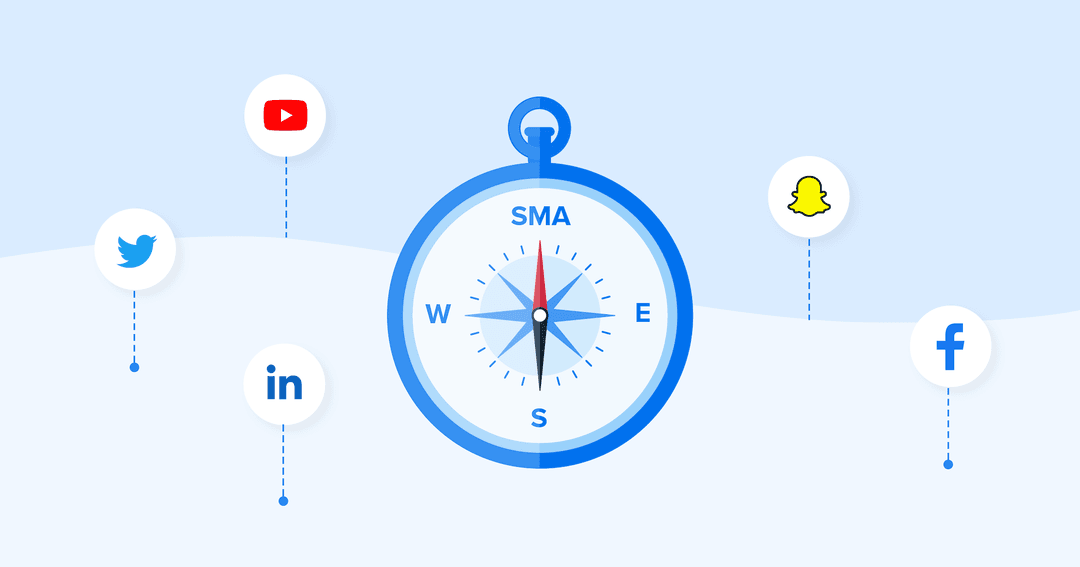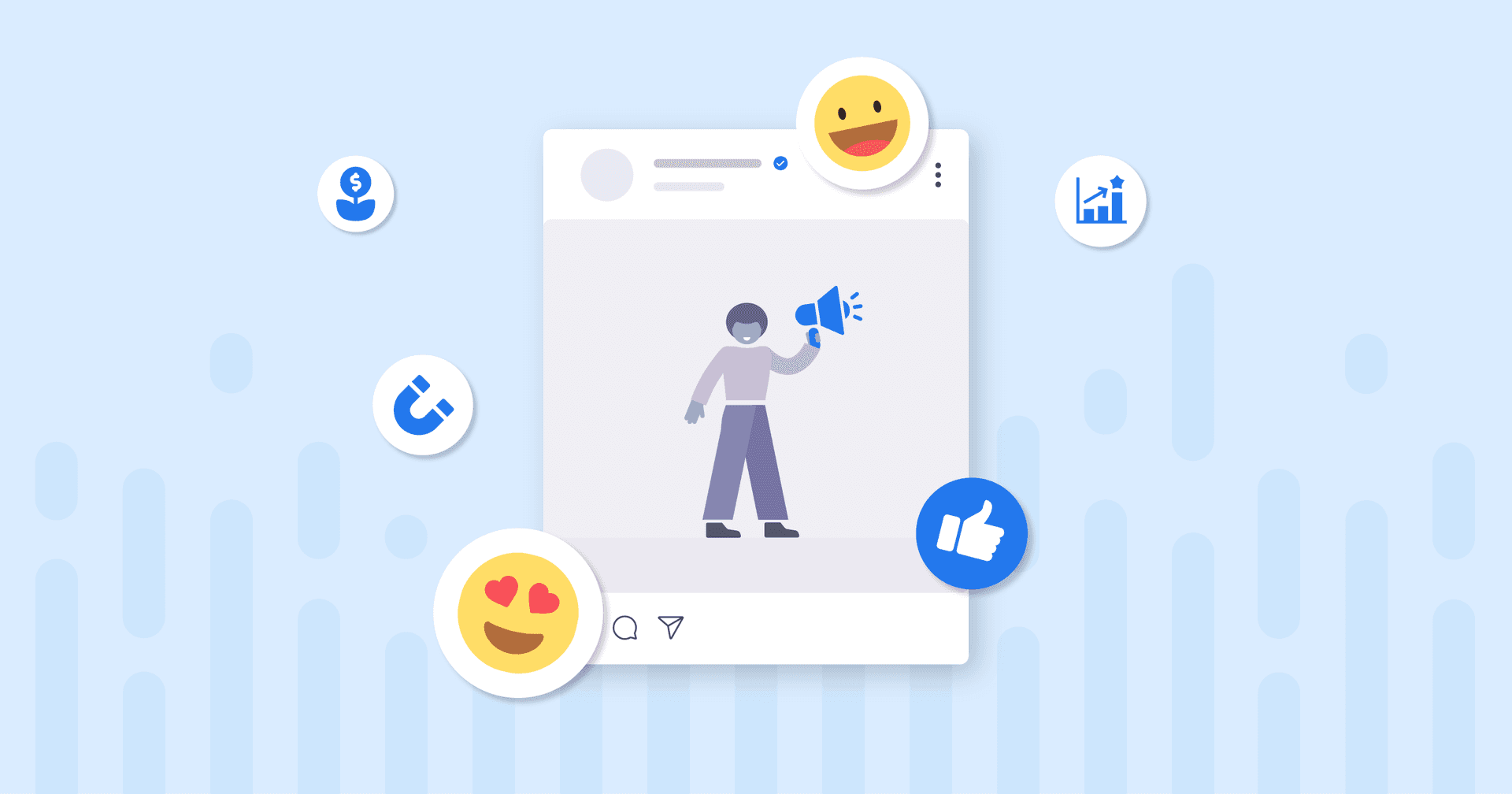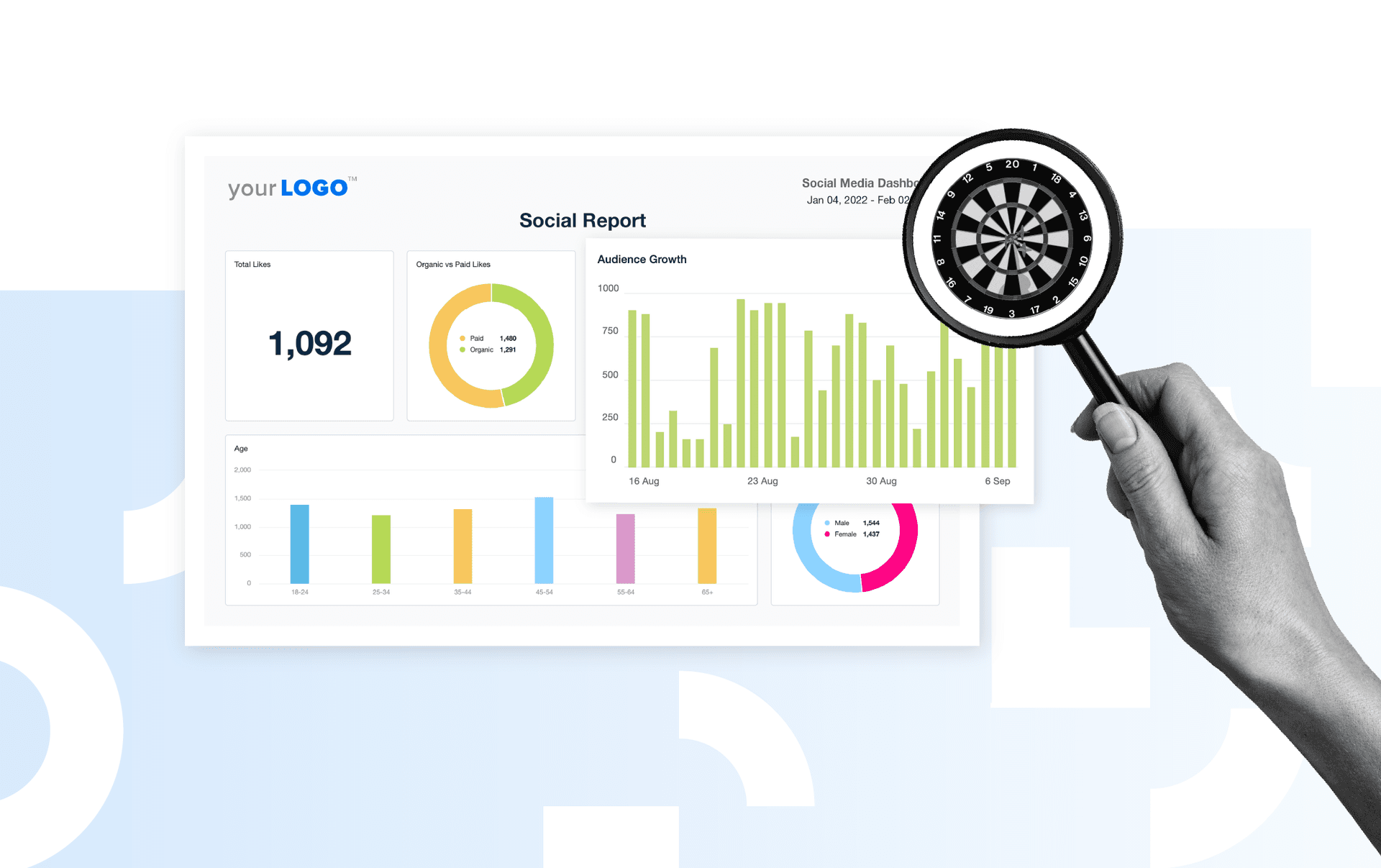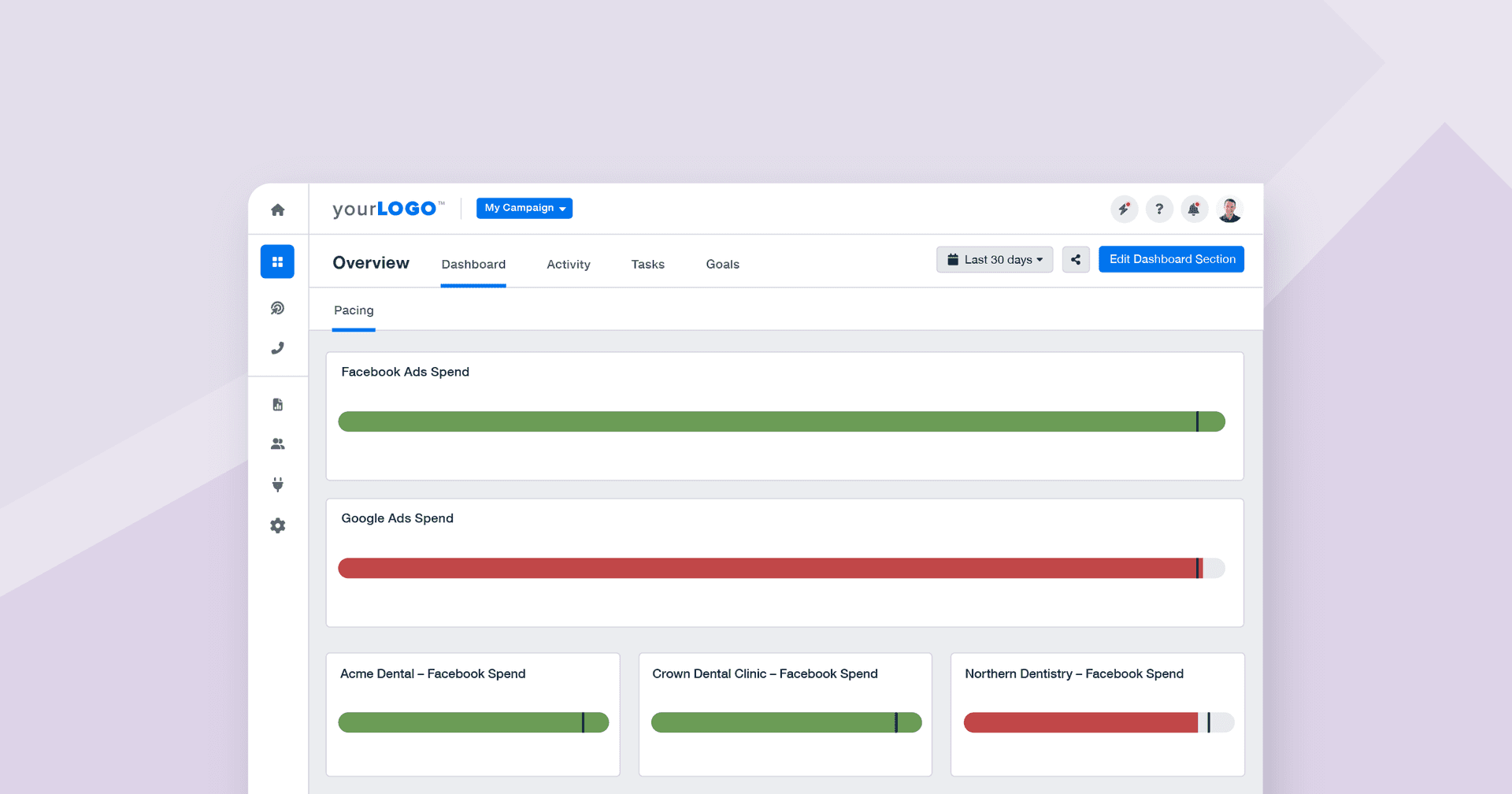Table of Contents
Table of Contents
- What Is Social Media Analytics?
- 4 Key Reasons Why Agencies Need Social Media Analytics
- What Does a Typical Social Media Analytics Process Look Like?
- Social Media Analytics in Action
- The Difference Between Social Media Data vs. Social Media Analytics
- Essential Metrics Your Agency's Social Media Analytics Tool Must Monitor
- Get a Free Social Media Analytics Template
- Top 12 Social Media Analytics Tools To Consider
- Prove Social Media Campaign Success With AgencyAnalytics
- Summary
7,000+ agencies have ditched manual reports. You can too.
Free 14-Day TrialQUICK SUMMARY:
Social media analytics involves scrutinizing data from social platforms to improve client reporting and campaign outcomes. This guide offers insights on utilizing these tools effectively, featuring expert advice from agency experts. It's essential for enhancing reporting capabilities and achieving lasting client satisfaction. Dive in for strategies for optimizing social media analytics and driving impactful results.
Social media isn’t what it was two years ago. With short‑form video continuing to dominate, social commerce accelerating, privacy changes and rising audience expectations for authentic community — plus AI making it easier than ever to extract actionable insights — social media analytics is no longer optional.
Social media offers your clients a unique opportunity to engage with potential customers, enhance brand visibility, and cultivate loyalty. However, for social media marketing agencies, the real task is deciphering the complex data and effectively showcasing ROI to clients.
The point of analyzing social media data isn’t just to report numbers—it's about telling a compelling story of success. In this guide, you’ll learn how to master social media analytics tools to enhance your reporting capabilities. Not only will your agency showcase its achievements, but it will also secure clients in the long run. We'll also get advice from our friends at OhMyDigital and other agency experts.
For agencies, mastering analytics today means staying ahead of real‑time trends, measuring true business impact, and offering strategic guidance clients can’t get just from a native Insights panel.
Dive in, and let's chart a course to success together.
What Is Social Media Analytics?
Social media analytics is the process of collecting, measuring, and interpreting data from social media platforms to inform smarter, more strategic decisions. It goes beyond simply tracking likes or followers—it’s about turning raw social media metrics into meaningful insights that guide a social media marketing strategy.
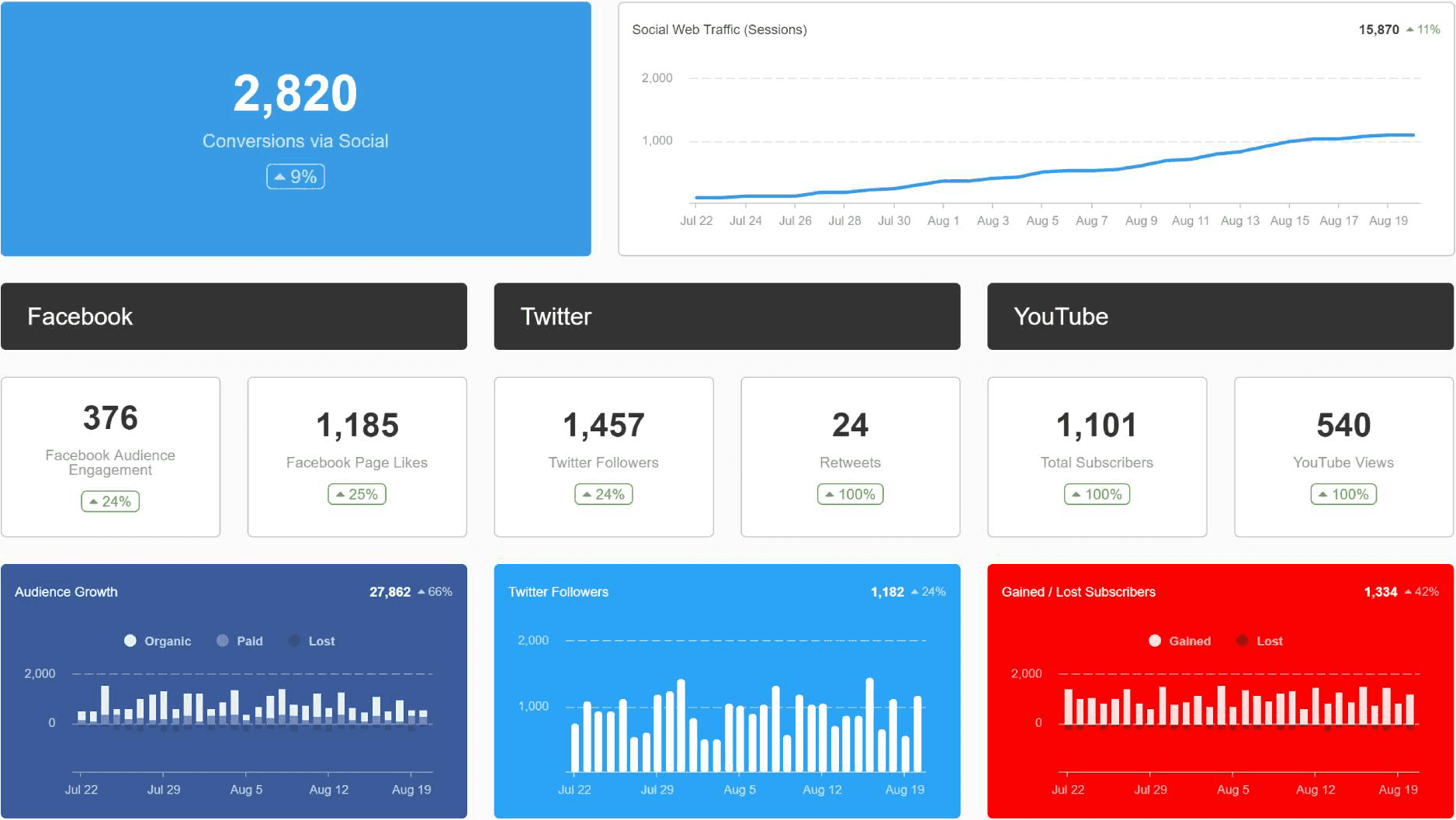
For social media managers and agency professionals, this means moving beyond vanity metrics and getting to the heart of what’s driving real business outcomes.
One time, on a social media ads campaign, we were bragging about how well the campaign seemed to be going because of our cost per view, which was $0.004. However, in the end, we didn’t get the revenue needed to prove success. The client saw the final results and it just wasn’t impressive.
Nathan Hawkes, President, Arcane Marketing
While it’s easy to get excited about surface-level numbers, social media analysis should aim to answer bigger questions: What content resonates most with your audience? Which channels drive the most conversions? Where should your clients focus their time and budget?
Social media analytics platforms help teams track performance across multiple channels, uncover patterns in historical data, and connect marketing activities to real business outcomes. It’s about helping social media professionals shift from just reporting on what happened to confidently recommending what to do next.
Whether you're managing multiple social media accounts or running a single high-impact campaign, tracking the right metrics is how you go from “busy on social” to being strategic.
4 Key Reasons Why Agencies Need Social Media Analytics
Agencies are no longer flying blind in the realm of social media marketing. Instead, they harness the power of digital marketing analytics tools media to make informed, data-driven decisions that ensure optimal outcomes.
We rely completely on social media analytics. They help us make better decisions (backed by data). Otherwise, we’d be winging it, and you shouldn’t be winging it when it comes to the success of your clients' businesses.
Hayley Peters, Co-Owner of OhMyDigital
Agencies need to leverage social media analytics tools to elevate their clients' social strategies across various social media channels.
By diving deep into audience demographics, agencies obtain a better understanding of their clients' target audiences. This insight into the audience's preferences, habits, and behaviors contributes to crafting highly tailored and effective marketing campaigns.
The use of sentiment analysis enables agencies to gauge public sentiment toward a brand or a product. This provides an invaluable opportunity to adapt their clients’ strategies accordingly, whether to mitigate a negative trend or leverage a positive one.
The primary responsibility of your agency lies in gathering diverse social media data from a plethora of platforms. Agencies must then evaluate this data to derive actionable insights that fuel informed business decisions.
These insights serve multiple purposes, such as:
Boosting clients’ social media presence
Planning social media posts to grow their social media audience
Performing sentiment analysis to monitor conversations and gather business intelligence
Using social listening tools to optimize marketing campaigns
Improving social media strategy with insights from social media data
Clearly communicating success to clients using a social media reporting tool
In essence, a robust social media analytics tool doesn't merely offer numbers and statistics; it equips agencies with a roadmap to navigate the complex terrain of social media marketing effectively.
What Does a Typical Social Media Analytics Process Look Like?
Behind every high-performing social media campaign is a structured analytics process. While each agency may have its own rhythm, the most effective strategies share a few common steps that help social media professionals stay focused, organized, and proactive.
1. Define Clear Goals Aligned to Business Outcomes
Before diving into the data, it's essential to define what success actually looks like. Is your client focused on brand awareness? Lead generation? Driving website traffic? Each goal will shape which social media metrics you track and how you interpret the results.
This step also helps avoid distractions from vanity metrics that look impressive but don’t reflect actual impact. By tying your social media marketing strategy to tangible business goals, your team is better equipped to track meaningful progress over time.
2. Track Social Media Campaigns Across Multiple Channels
With so many platforms in play, social media managers must monitor multiple social media accounts across various channels—from Instagram and LinkedIn to TikTok and YouTube. The challenge is not just tracking each campaign, but understanding how they work together.
That’s where centralized dashboards and social media tools come in. They pull all your data into one place, making it easier to track campaign performance across multiple social media platforms—without jumping between tabs or exporting endless spreadsheets.
3. Gather and Analyze Social Media Data
This is where the real social media analysis happens. You’ll look at engagement trends, identify top-performing posts, evaluate paid ad performance, and spot shifts in audience behavior using historical data.
With social media analytics reports, this process becomes faster and more visual. Patterns start to emerge, and insights surface more clearly—like which content types resonate best or which channels are underperforming.
4. Translate Insights Into Action
Data is only valuable if it leads to decisions. The most impactful social media analytics processes end with a clear takeaway: what to keep doing, what to pause, and where to test something new.
This is your opportunity to add strategic value. By delivering recommendations backed by social media insights, your agency helps clients refine their messaging, optimize spend, and stay competitive.
Don’t forget the blind spots. Even the most sophisticated analytics stack won’t capture everything—especially with the rise of dark social (private messages, DMs, Slack shares) and zero-click content (when the audience consumes content without taking a trackable action). These trends make attribution harder—but also more important. Agencies need to lean into pattern recognition, cross-channel insights, and clear storytelling to connect the dots between social engagement and actual business impact. Your clients don’t just want the numbers—they want to know what those numbers mean.
Social Media Analytics in Action
Let’s take a look at four different scenarios where social media analytics comes into the picture.
1. Making Data-Driven Decisions in Social Media Management
To the seasoned social media marketer, social media marketing represents a vibrant, living organism in a state of perpetual flux. Every day, millions of users make split-second decisions on various social channels, responding to a multitude of factors that are often elusive, challenging to quantify and predict.
These individual reactions can ignite significant momentum in mere minutes. Social media shaped by user actions can diverge, connect, amplify, and even erase narratives in the blink of an eye (think cancel culture).
A torrent of activity is happening each day. It's this endless flow of user engagement that has the potential to prompt swift, unexpected changes that drive social media trends.
Influencer marketing, for instance, plays a pivotal role in this ever-shifting ecosystem, where a single viral social media post can significantly alter the trajectory of marketing campaigns. The key, however, lies in understanding the patterns within this complex web of interactions and closely monitoring audience demographics.
Harnessing the power of a robust social media analytics tool is essential to track, interpret, and learn from this vast pool of social media data. Managing your clients' social media is no longer just about crafting engaging posts; it involves dissecting social media data, leveraging insights to drive strategic decision-making, and understanding audience demographics to create more targeted and effective content.
With a social media management tool, agencies make informed, data-driven decisions for their clients. It facilitates the tracking of ongoing trends, monitoring engagement levels on different social media channels, evaluating the performance of marketing campaigns, and analyzing audience demographics for optimal content alignment.
Ultimately, navigating social media marketing requires a keen understanding of the dynamics at play. By leveraging sophisticated analytics tools and keeping a finger on the pulse of social media data, your clients anticipate changes, manage risks, and seize opportunities.
2. When Your Clients Thought They Could Do Social Media Themselves
Agency clients, often well-established within their industry, commonly find themselves caught in a time-skill bind when it comes to managing their social media accounts.
This observation is pointedly made by Hayley Peters, Co-Owner of OhMyDigital. She articulates that businesses, more often than not, lack the necessary time and expertise to orchestrate and maintain effective marketing campaigns through their social media channels.
The most recurring pitfall she identifies with new clients is their frenzied attempt to maintain an omnipresence across all major social media networks. Without a solidified plan of action or strategic blueprint, these businesses end up "trying to do all the things" without fully understanding the distinct dynamics of each platform.
In the complex maze of social channels, it's easy to be overwhelmed. As Peters explains, businesses often feel compelled to match their competitors' pace, which may involve hopping onto every fleeting trend or maintaining an incessant posting frequency. This frantic race not only leads to burnout but also dilutes the quality of their social media content.
“They often think that because they see their competitors jumping on trends and posting daily that they need to do it too. Consequently, they find themselves caught in the trap of mass-producing content, instead of slowing down and focusing on crafting fewer, but qualitatively superior posts,” says Peters.
Agency Tip: If you encounter prospective clients that are on the fence about hiring your social media marketing agency, do a simple Social Media Audit to show them what’s working and what’s clearly not. This allows them to see the value your agency will bring to their business.
Being successful on social media is about more than just creating content. It involves sentiment analysis to gauge public opinion, influencer marketing to expand reach, and tailoring unique messages for each platform. These tasks are often best handled by a dedicated agency that knows how to maximize the potential of social media platforms.
Agencies possess the expertise and social media analytics tools necessary to navigate these channels, ensuring that their clients’ brand message is amplified without sacrificing quality.
3. Crafting Plan Across Multiple Social Media Platforms
Understanding the nuances of various social media platforms and harnessing them effectively is the cornerstone of any successful social media strategy.
Every social media platform, from established networks (Instagram, Facebook, LinkedIn) to now‑mainstream video-first platforms (TikTok, YouTube Shorts, Reels), has unique content formats, audience behavior, and performance metrics. What worked a year ago may not work today .
Instead, agencies should craft bespoke strategies for each platform, accommodating the unique characteristics and user behaviors inherent to each.
For instance, Instagram's visual-centric nature might make it the go-to platform for brands with strong visual content, while Twitter's (now known simply as “X”) real-time nature might be more suitable for brands looking to participate in immediate conversations and updates.
Similarly, LinkedIn could be the ideal platform for B2B companies seeking to engage with professionals and decision-makers in their industry.
Understanding various social media platforms is just the beginning. Agencies also need to know how to devise and execute effective social media strategies.
This involves staying abreast of the latest trends and shifts on social media, as they can considerably impact the effectiveness of social media campaigns. Such campaigns often incorporate influencer marketing and sentiment analysis as integral components of their strategy.
It also includes setting clear goals, identifying target audiences, crafting engaging content, and measuring performance against set objectives using robust social media analytics tools.
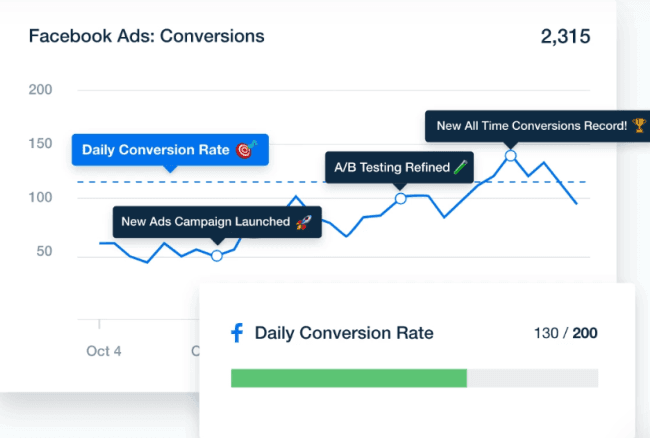
Establish clear objectives for your marketing teams to easily keep track of. Test the goals feature with your 14-day AgencyAnalytics free trial!
Moreover, the emergence of multiple social media platforms necessitates the need for agencies to manage multiple accounts simultaneously. This complex and time-consuming task is crucial for reaching a wider audience and maintaining a consistent brand presence across all platforms.
Understanding social media platforms and their strategies goes beyond just knowing how to use social media. It's about knowing how to utilize it efficiently to attain specific marketing goals, extract value from social media data, and deliver value to clients.
4. Continual Optimization Is a Fundamental Aspect of Social Media Campaigns
When asked about the significant transformations observed on social media over the past few years, Hayley Peters, Co-Owner of OhMyDigital, underscored two pivotal aspects: brand culture and technological advancement.
She emphasizes how the contemporary consumer yearns for authenticity and is drawn toward brands that embody these principles at every touchpoint across social media channels.
People demand more authenticity, and they crave brands that have strong values and actually live and breathe those values. Customers look for them at every touchpoint, and they aren’t afraid to call brands out if those values are lacking.
Hayley Peters, Co-Owner, OhMyDigital
Social media marketers are intertwined with the technology they deeply depend on. Not only do they need to maintain a comprehensive understanding of their campaign metrics, but they also need to stay ahead of the curve with emerging technological trends.
There’s also so much more reliance on keeping up with changing technology. From moving storefronts online to providing a better customer experience throughout the whole journey and automation to make processes more efficient.
Hayley Peters, Co-Owner, OhMyDigital
Agencies are tasked with the critical duty of quantifying how their clients' social media performance impacts core business objectives and the bottom line. This is where the use of social media analytics tools becomes paramount.
Interpreting social media data is more than just number crunching. It involves using a sophisticated social media analytics tool to make sense of these metrics and translate them into actionable insights. Data and metrics are invaluable.
However, without a clear understanding of how to leverage them, potential learning opportunities may be overlooked.
Effective social media management needs a well-rounded understanding of social media analytics. This ensures that the content generated, whether it's social media posts or comprehensive marketing campaigns, is not only engaging but also optimally effective.
For this, a robust social media management platform becomes an indispensable asset. It allows for a thorough understanding of user engagement and audience behavior, enabling businesses to continually optimize their campaigns and meet their core objectives.
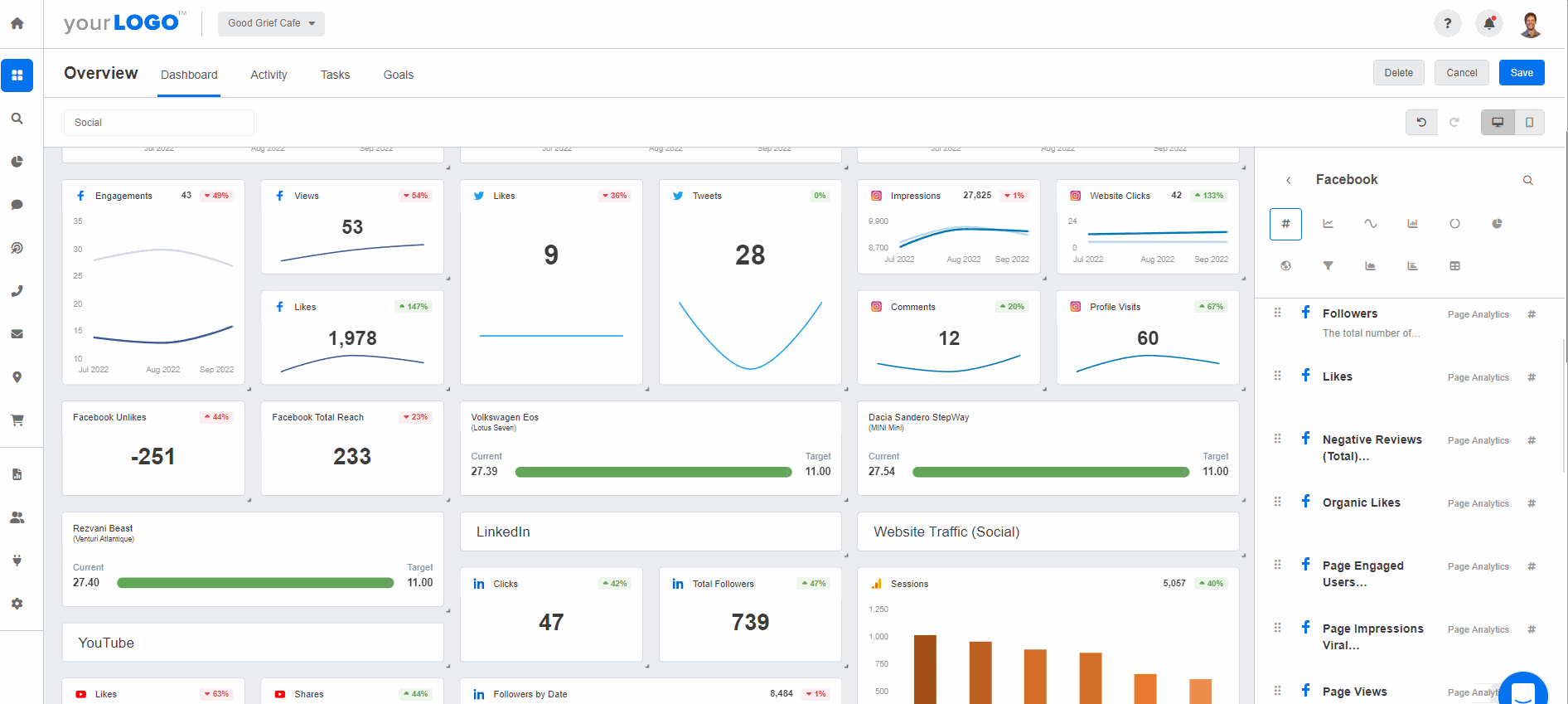
Keep tabs on your clients’ social media performance insights in a single dashboard with a social media analytics tool specifically built for agencies. Up your reporting capabilities with AgencyAnalytics–start your free 14-day trial today.
The Difference Between Social Media Data vs. Social Media Analytics
Let’s make one thing very clear: social media analytics and social media data are inextricably linked but are not one and the same. Every social media platform has its own section with metrics–aka social media data.
Social media data is the classic gathering of basic metrics such as ‘Likes’ and ‘Shares’. Social media analytics, on the other hand, takes that data to another level by making it actionable. It’s a bit like the vanity metrics versus the actionable metrics debate.
Knowing this difference will make or break your client reports: you can either inform your agency’s future social media marketing efforts and give clear business insights for your clients, or report only on the fluffy stuff that makes your client feel good in the short term, hurting client retention down the road when they see no actual ROI.
Here are some examples of the difference between social media data and how they translate to social media analytics:
Social Media Data: The “What” | Social Media Analytics: The “So What?” |
|---|---|
Engagement Metrics | Your engagement metrics are an indicator that the content you’re creating is hitting the target. It answers: Is my content resonating with my client’s audience? What types of content should I create more of, and what’s not working as well? |
Reach Metrics | Reach metrics indicate your campaign’s success at getting in front of a target audience–and at pleasing the algorithms. If you see an immediate drop in these metrics, ask yourself: Should I boost this post? Is my content targeting the right audience? Am I posting at the right time for the target audience? Does my format match the latest standards on this platform? Conversely, if you see a significant reach but a low engagement from your client’s ideal customer persona, that could mean that you’ve pleased the algorithm but not the target audience. |
Conversion Metrics | Your conversion metrics will depend on your clients’ business goals. They should answer the question: Are my campaigns really doing what they are supposed to do? AKA: Am I driving results that are in line with my client’s business goals? |
The real challenge (which is really an opportunity for your agency to shine) is not only showing the numbers that matter but what to do about them. After all, they hired you not just to create exceptional social media content, but also to make sense of the data.
So what do clients look for in their reports?
“Definitely the highlights and improvements in each month,” says Hayley, Co-Owner of OhMyDigital. “They look to see what our recommendations are, the key highlights that we’ve found interesting, and how we’re using that social data to make informed decisions for the next month.”
Essential Metrics Your Agency's Social Media Analytics Tool Must Monitor
Having delved into 'why' your agency requires a robust social media analytics tool, it's time to pivot our focus to 'what' needs to be tracked.
To prime your clients for success, it's crucial to monitor the most relevant metrics that holistically encapsulate your client's social footprint. (Hint: The best social media analytics tools automatically collate these data points, thereby sparing your agency the time-consuming task of manual assembly.)
Let's investigate the critical metrics your social media analytics platform should monitor for on-demand analysis.
Beyond classic metrics like reach, likes, and shares, agencies in 2025 are increasingly tracking sentiment, audience engagement quality (e.g., time spent, comments depth, shares over time), content‑type performance (short video vs static post vs story vs reel), and conversion attribution — especially when social media is linked to e‑commerce or website actions.
A good analytics setup ties social metrics with web analytics (e.g., GA4) to reveal full‑funnel impact.
1. Audience Analytics
The bedrock of your clients' social media presence and social commerce achievement is their audience, with changes in this demographic directly impacting their success. It's crucial to emphasize any shifts that relate to behavioral changes.
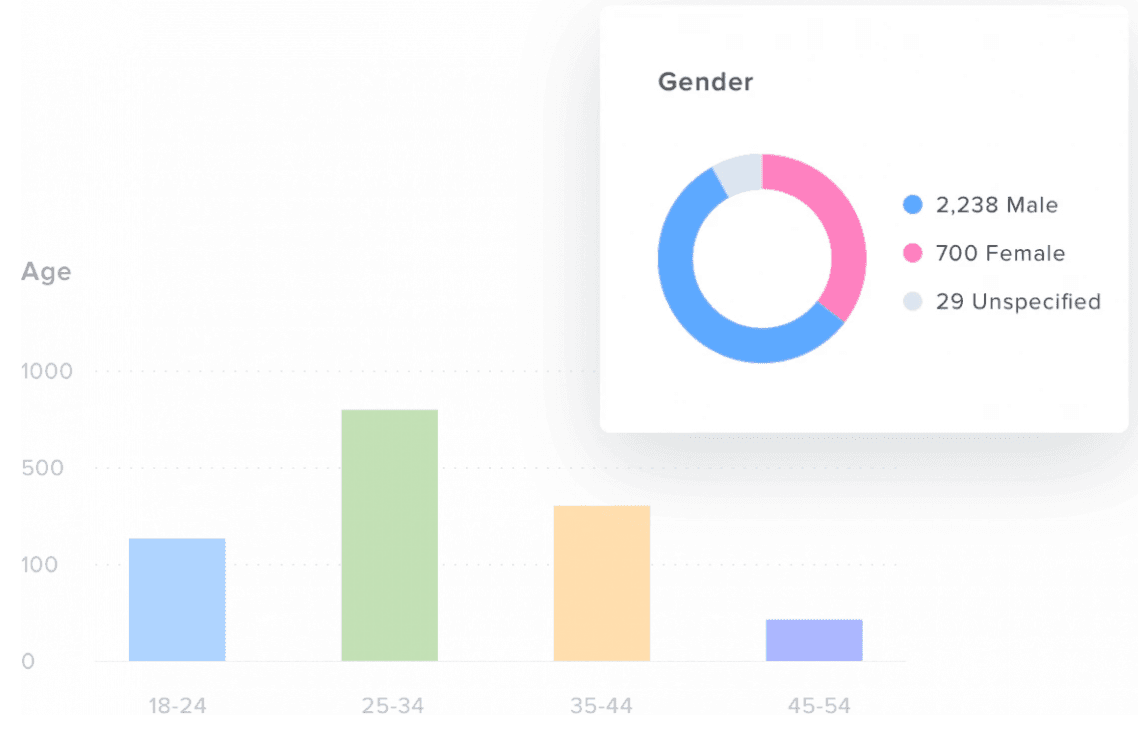
Analyzing follower data derived from location, age, gender, and language ensures your clients’ messaging effectively connects with the target audience. This swift access to audience demographics data streamlines targeted content creation, persona segmentation, and diversification of content across different social platforms.
Regular tracking aids in identifying audience growth trends and demographic changes to maintain optimal reach. Moreover, this data can alert your agency to any deviations if campaigns start attracting an unintended audience.
Agency Tip: Use audience demographics to guide platform selection. If Instagram and TikTok are thriving, and Gen Z dominates, Snapchat might be a strategic platform to consider.
2. Brand Analytics
Brand analytics ensure that a client’s brand experience meets consumer expectations. They are also instrumental in validating (and, if necessary, pivoting) your client's marketing strategy and enhancing their branding.
Your social media reporting tool should efficiently synthesize information usually found in the ‘Insights’ panel on platforms like Instagram and Facebook to present:
Social reach metrics, such as the number of people viewing a post, illustrate the efficacy of your clients' social media accounts in attracting new audience members.
Referrals indicate whether your content is successful in driving traffic to your client's website, which corresponds to Organic Performance Stats to be discussed later.
To streamline data collection, add the Google Analytics (GA4) dashboard data to your social media reports, presenting these metrics and KPIs directly from your client’s GA4 integration.
AgencyAnalytics’ GA4 integration allows you to track how your social media efforts are driving traffic to your clients’ websites and contributing to their overall business goals and provides a more holistic view of your clients’ online presence.
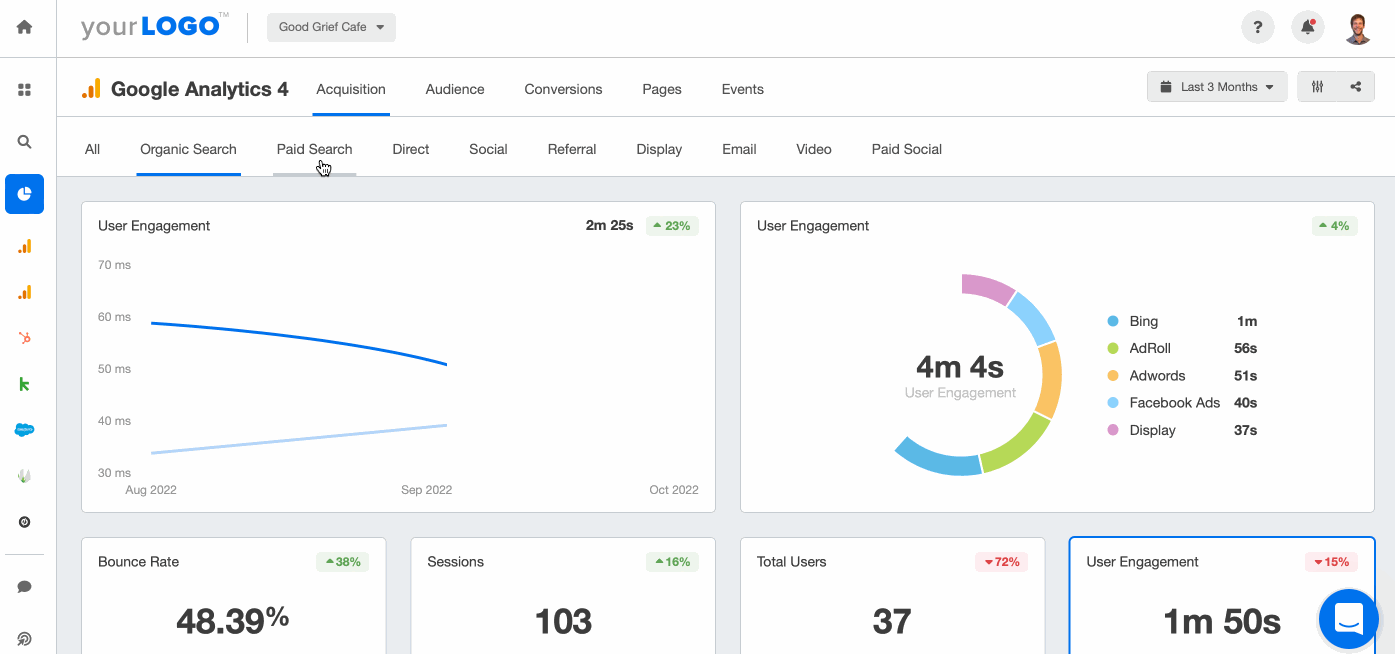
Your clients will appreciate insight into how their social platforms contribute to increased website traffic and, ultimately, conversions.
Follower growth rate, a clear indicator of audience growth, should consistently increase over time.
Engagement rates, a vital metric, show that users are resonating with the content disseminated on various social networks. Analyze top-performing posts to understand what drove their success in garnering more likes, shares, or comments.
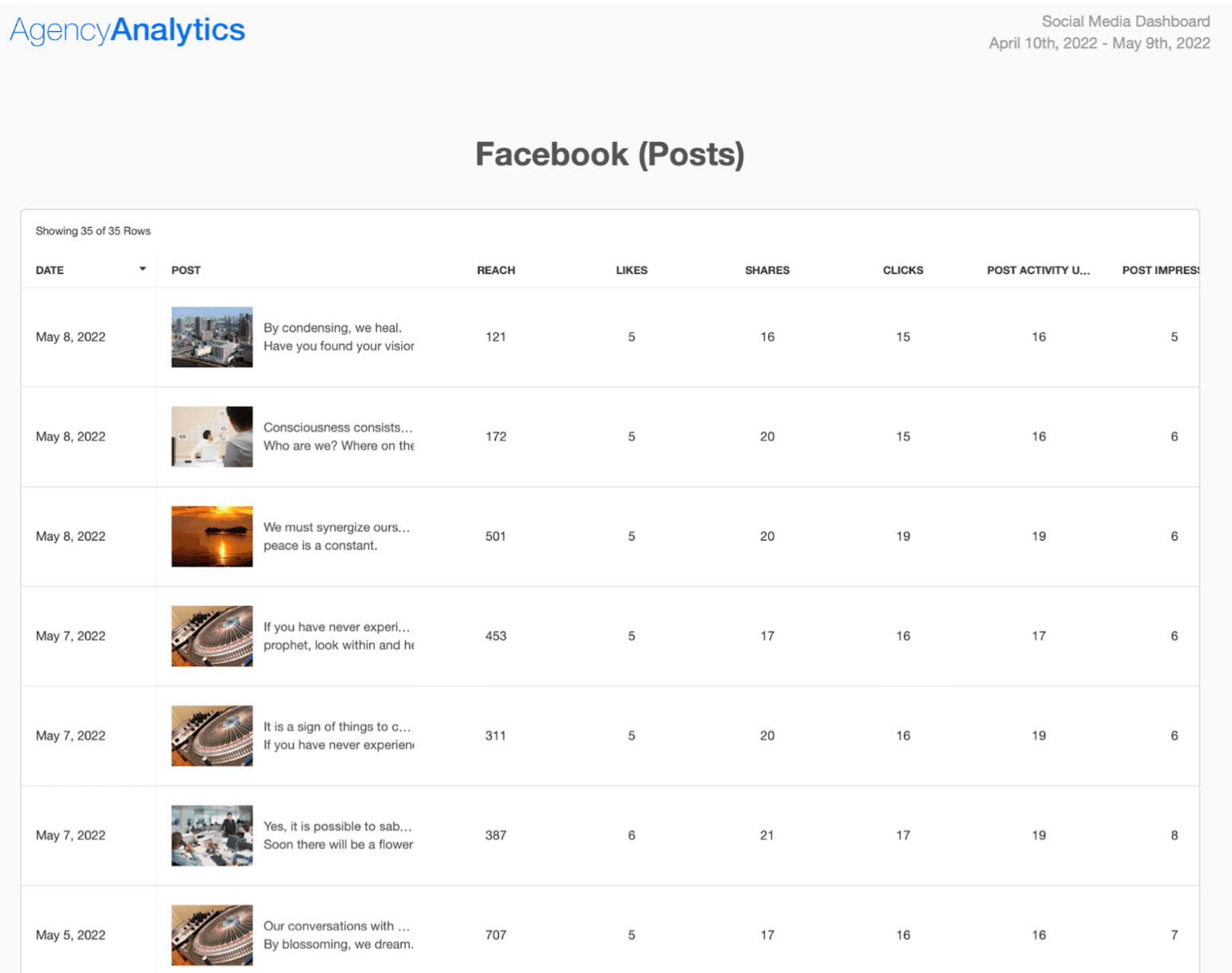
Demonstrate success using an AgencyAnalytics social media marketing integration, like a customizable Facebook Report Template. Get started with a 14-day free trial.
Your social media analytics tool should include all your clients’ recent social media posts, tweets, pins, etc.
This way, tracking, and presentation are simplified, making screenshots and spreadsheets unnecessary.
3. Organic Social Media Performance Analytics
Unless your clients solely focus on social commerce, i.e., selling directly from their social media, it's important to monitor their overall website traffic. Correlating social media growth with increases in website traffic can significantly boost your agency’s credibility.
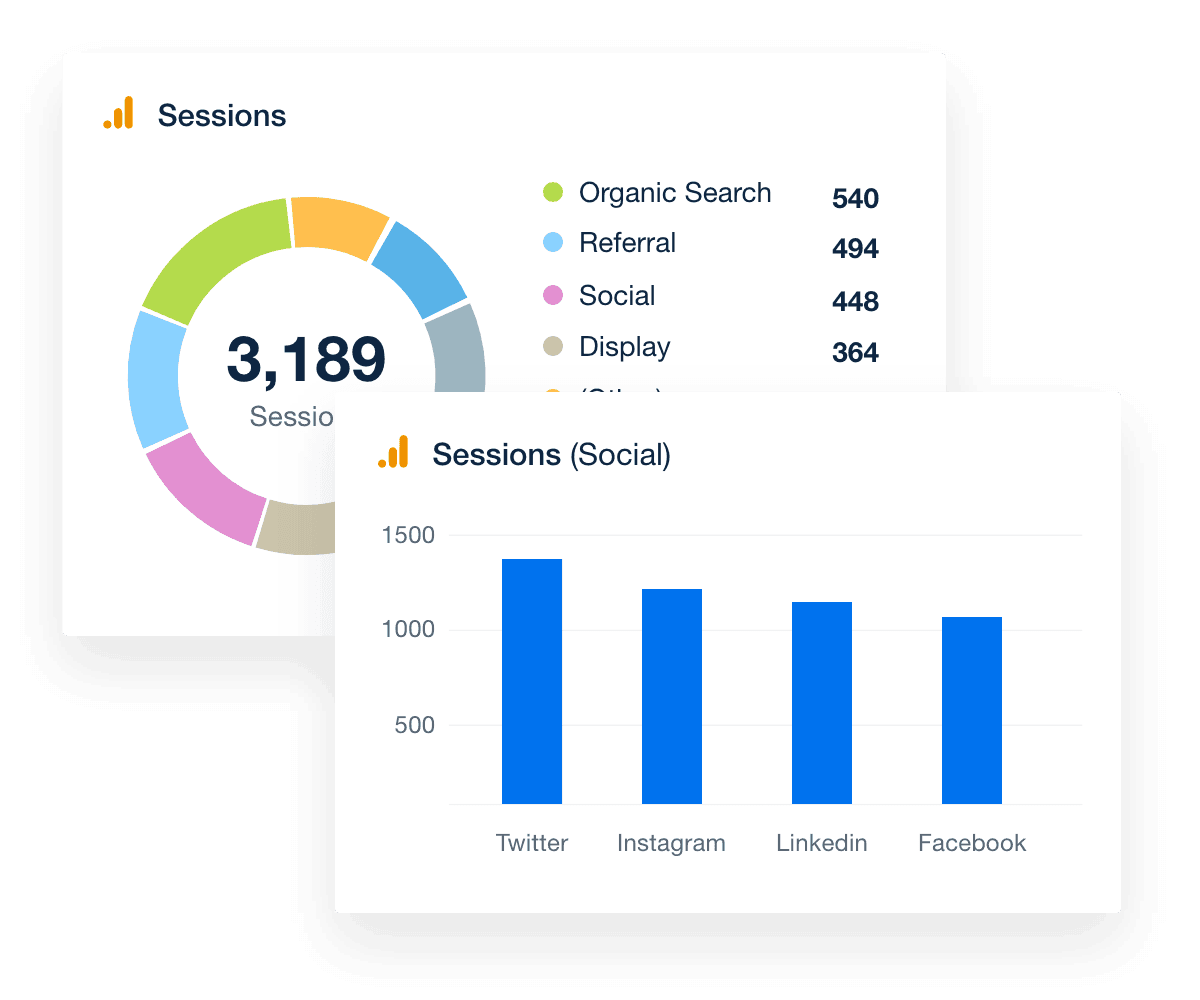
By showcasing referrals from social media and conversion rates, you present the ROI, which is ultimately what your clients want to see.
You can also start to correlate your agency’s social media efforts with the impact on other channels. For instance, a strong social media presence often leads to an increase in direct and branded search traffic.
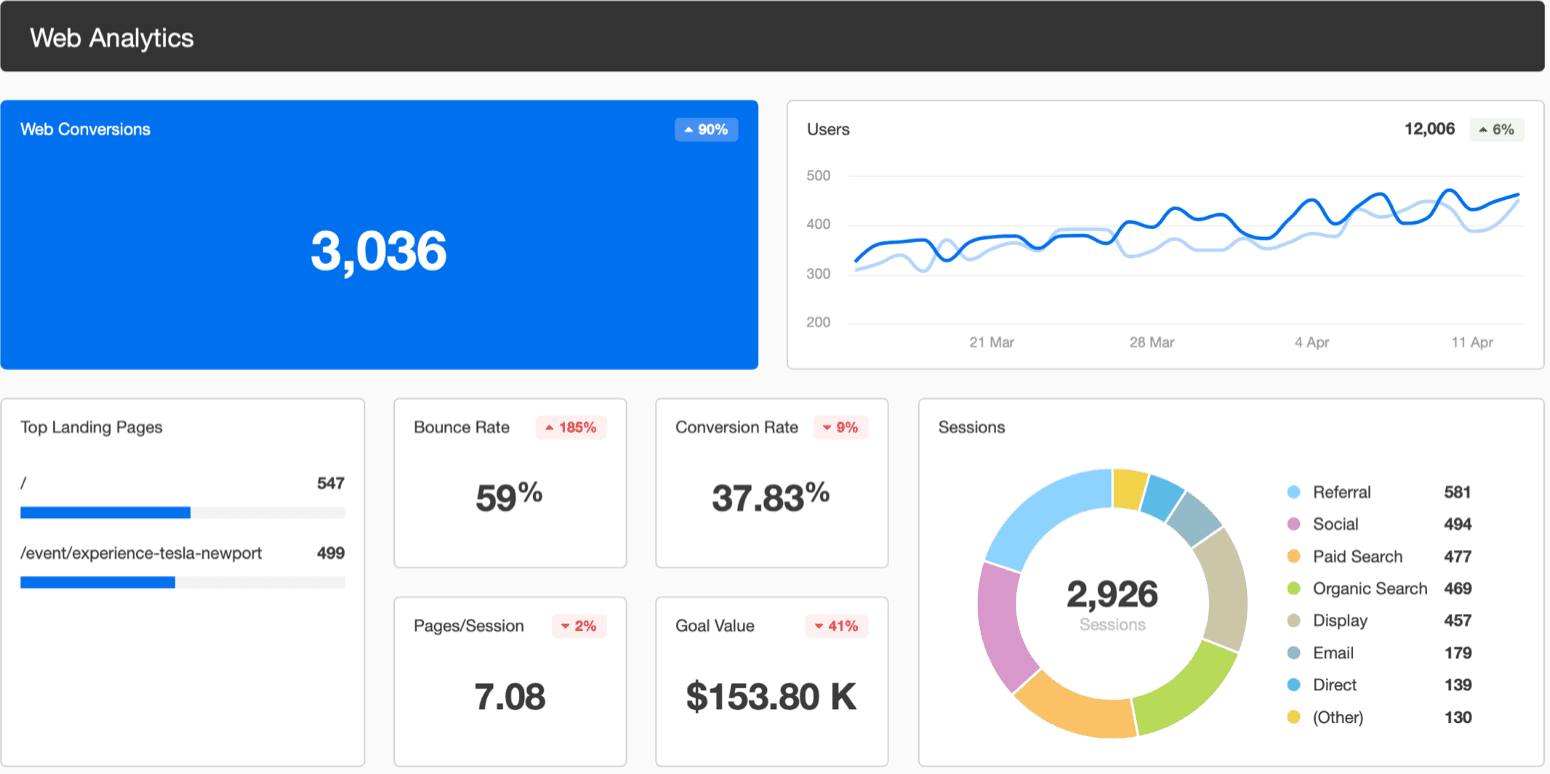
Show clients their top landing pages, bounce rates, and conversion rates, along with their dollar value and more, using a Web Analytics Dashboard.
4. Paid Social Ads Analytics
No social media campaign is complete without paid advertising. As such you need to be keeping track of your client spend, and how it’s contributing to the broader social media strategy, as well as how social advertising is contributing to your clients’ overall business.
Your social media analytics tool should quickly track all your PPC campaigns on social media in one place–easy to analyze, and easy to present.

Give your clients maximum visibility on their paid social media accounts with our PPC reporting software that integrates with all major social media channels–from Facebook Ads to LinkedIn ads, and more.
5. Competitive Analytics
Maintaining an active awareness of your clients' competitors is vital, although it can be time-consuming without efficient social media management tools. Utilizing competitive analysis tools empowers you to effectively monitor your competitors' activities. So how can these statistics be incorporated into your reports?
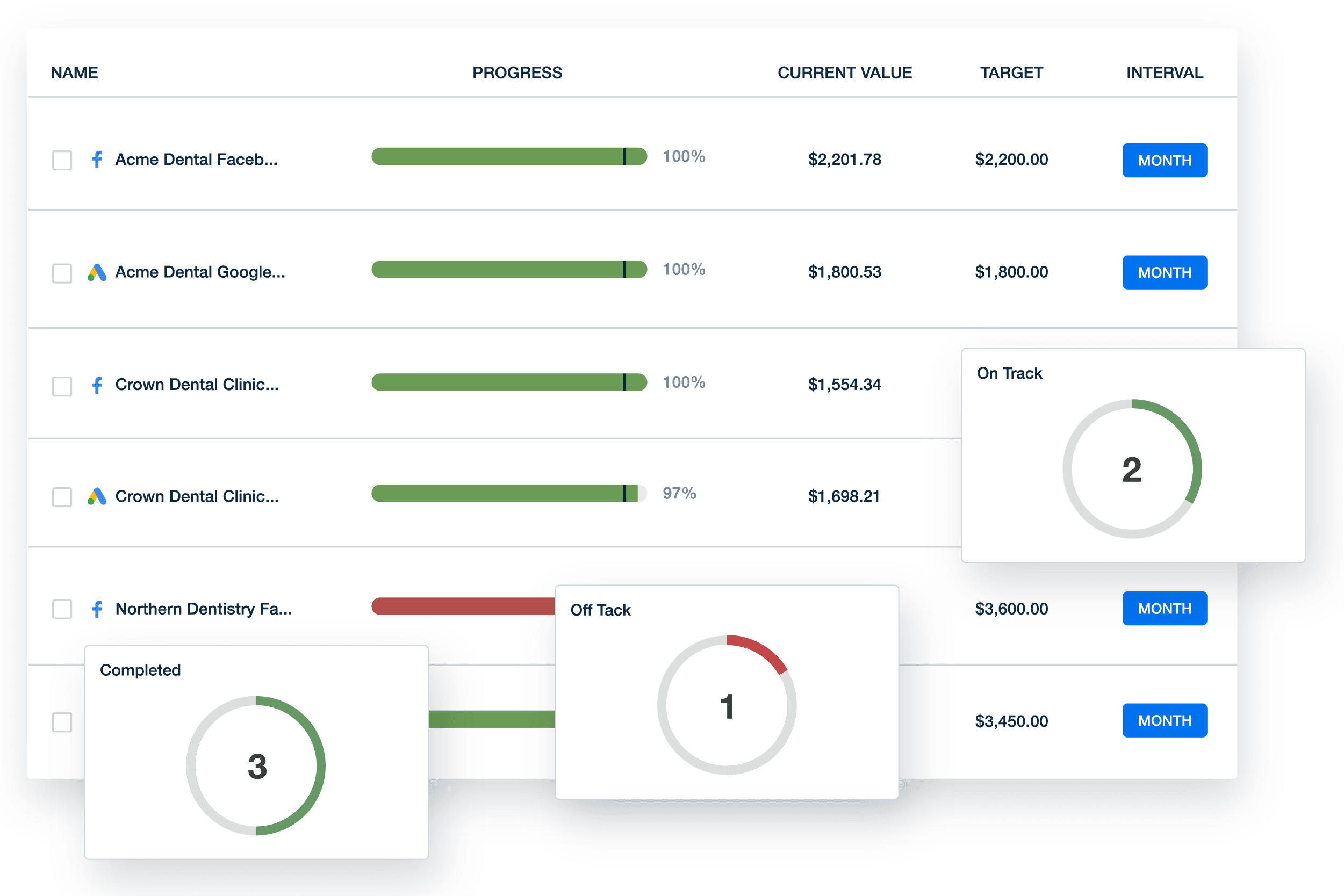
Implement goal-tracking to benchmark social media performance against your client's competitors. Draw comparisons on key metrics such as audience growth, engagement, posting frequency, and popularity of posts. This comparative analysis allows you to adapt your content strategy to stay ahead on social media.
6. Customer Satisfaction Analytics
Almost half of consumers expect a response from a brand within an hour of reaching out on social platforms. Consequently, your clients' online responses significantly influence their brand image. Monitoring this will assist your social media team or your clients (depending on the mandate), to better manage their response times.
Staying updated with activities on review platforms provides your clients with valuable insights into their performance and aids in managing their reputation. However, it's easy to miss an opportunity to respond to customer reviews unless your social media analytics platform encompasses a comprehensive management system to track them.
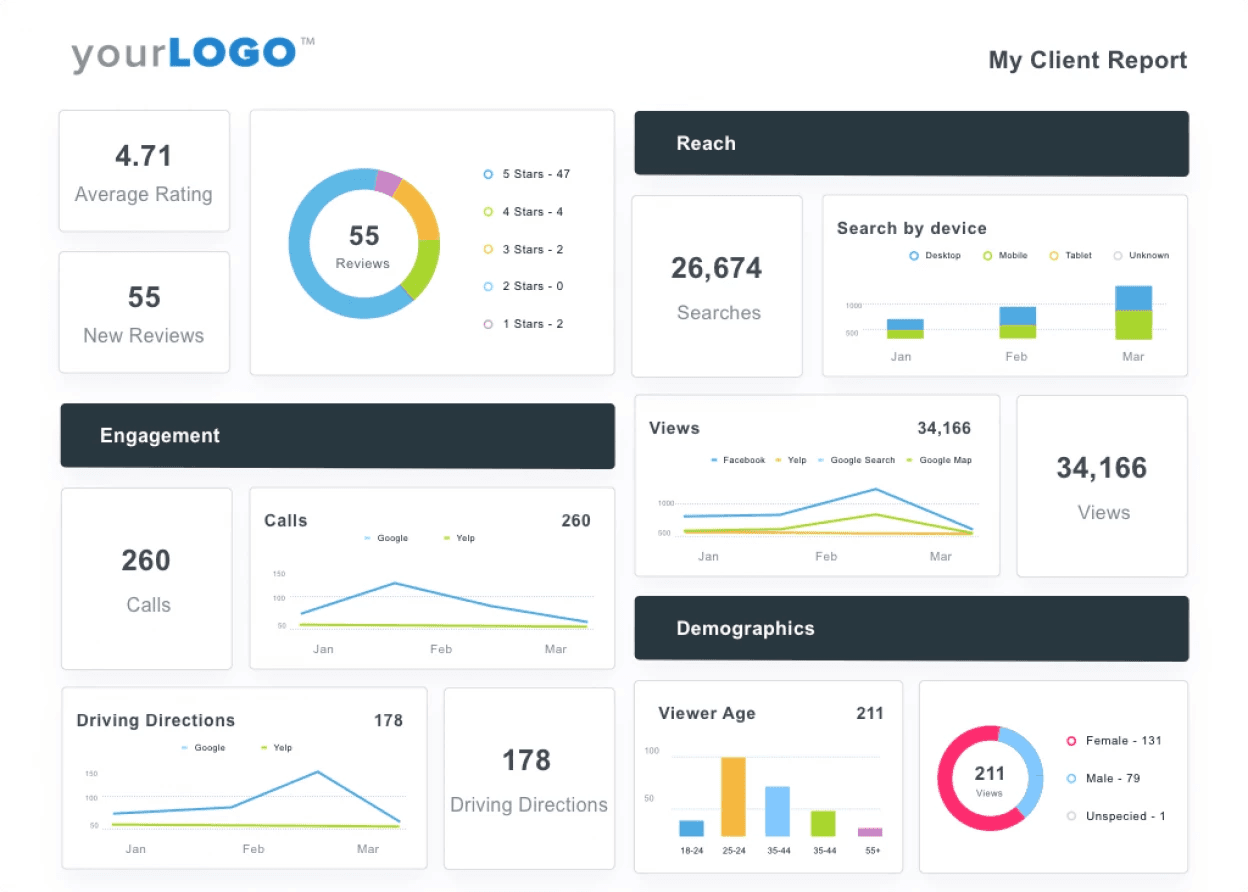
Reputation management reporting facilitates responding to queries and comments from one central location. Offer your clients their own login, enabling them to respond directly through the platform, enhancing customer satisfaction, and contributing to a positive brand image.
7. Influencer Analytics
Influencer marketing involves tracking key metrics to measure the success of your influencer marketing campaigns. Identifying whether an influencer has significantly boosted your clients' Instagram impressions overnight can be challenging to present without the right social media management tool.
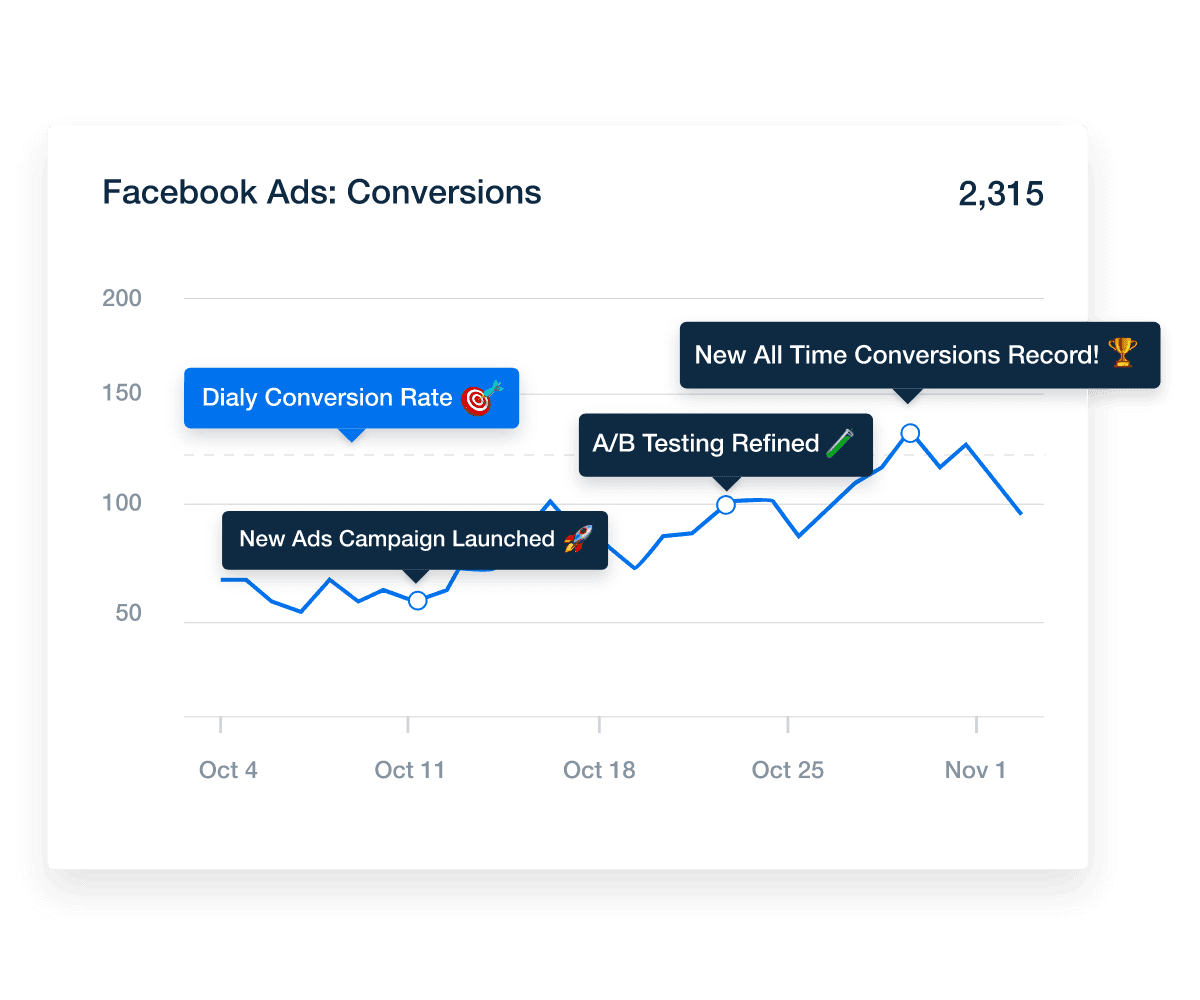
Use an annotations feature in your time-based charts to track when something was launched or posted. This immediately demonstrates the impact of collaborating with a particular influencer on your clients, helping them decide whether to continue working with them.
Get a Free Social Media Analytics Template
Need a faster way to build professional, insightful social media analytics reports? We've got you covered.
The Social Media Report Template from AgencyAnalytics gives you everything you need to showcase performance across multiple channels—without hours of manual work.
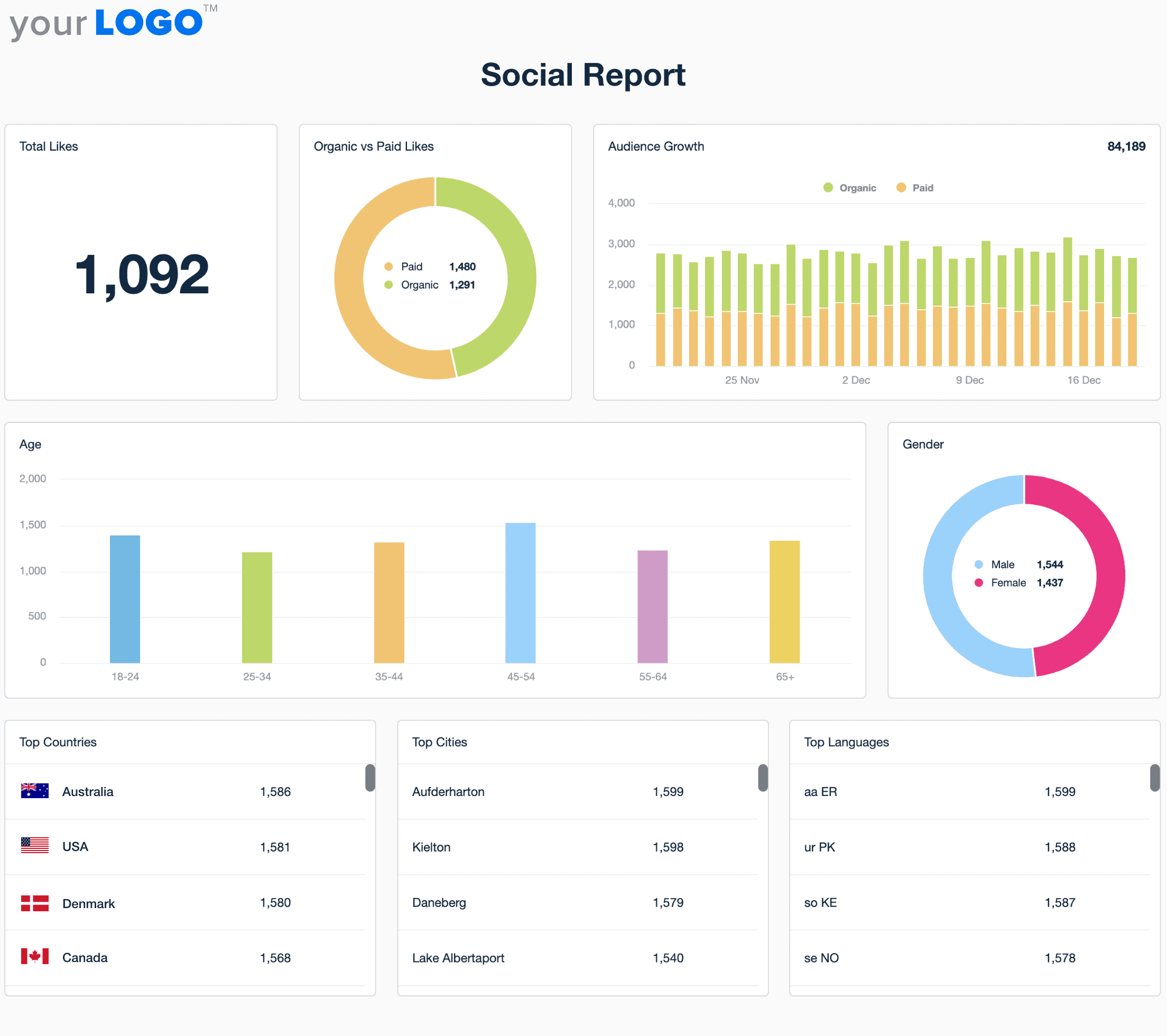
Whether you’re tracking engagement, conversions, or audience growth, this customizable template pulls data from your client’s connected accounts and transforms it into a visual, client-ready report in minutes.
Collecting critical data all in one spot is amazing and has bought us time back. When you are tracking SEO, PPC, social media, and email marketing campaigns it can be time-consuming. This is why having a template and dashboard that efficiently does it all is a game changer.
—Justin Hual, Co-Founder + COO, HIP Creative
Use it to:
Track social media analytics across platforms like Facebook, Instagram, LinkedIn, Twitter (X), and more
Compare results across multiple social media accounts
Identify trends with historical data
Communicate your agency’s value with clean, branded visuals
Save time every month with automated updates and scheduling
👉 Grab your free social media analytics template here.
With ready-made templates and real-time data integration, you’ll spend less time building reports—and more time optimizing campaigns.
Top 12 Social Media Analytics Tools To Consider
Given the importance of comprehensive data analysis for social media management, choosing the right social media analytics tool significantly impacts your clients' brand success.
Here are twelve robust social media analytics tools to consider
Sprout Social – All-in-one analytics and engagement platform for agencies

As a robust social media analytics tool, Sprout Social offers extensive capabilities covering management and detailed analytics. It integrates with various social platforms, which enhances its usability for diverse marketing needs. Audience segmentation, persona creation, and competitive analytics are some of the many features that this social media management tool offers.
Pricing: Starts at $199 per month.
Hootsuite – Trusted dashboard with scheduling, analytics, and team collaboration
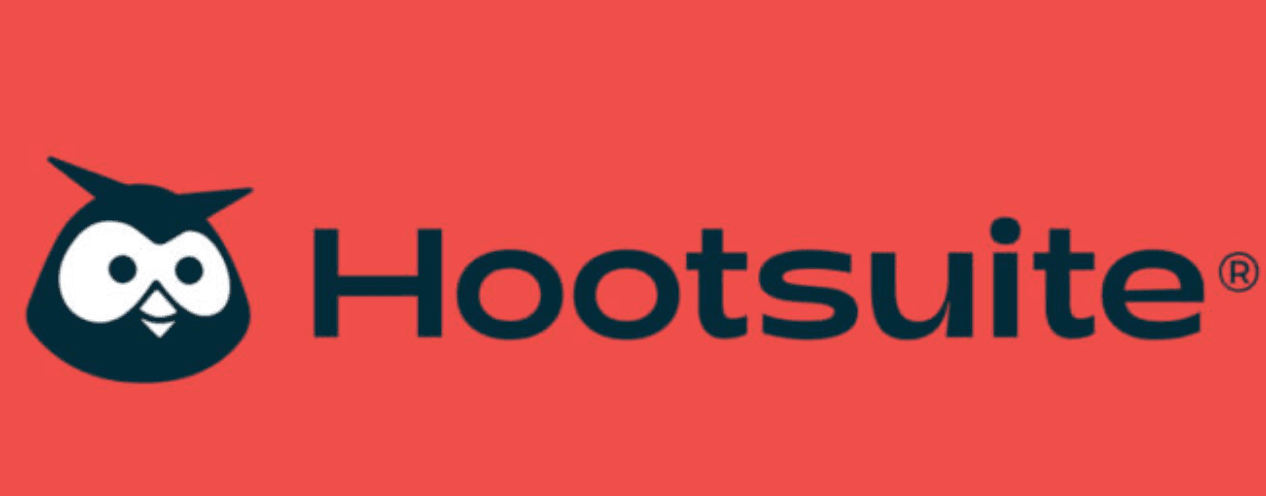
Hootsuite stands out among social media analytics tools for its all-in-one dashboard that allows management and tracking of all social media channels. It streamlines social media marketing by enabling scheduling of posts and team collaboration. Also included are features for social listening and sentiment analysis, making it a versatile social media analytics tool.
Pricing: Starts at $99 per month.
BuzzSumo – Excellent for content insights, influencer tracking, and competitor analysis
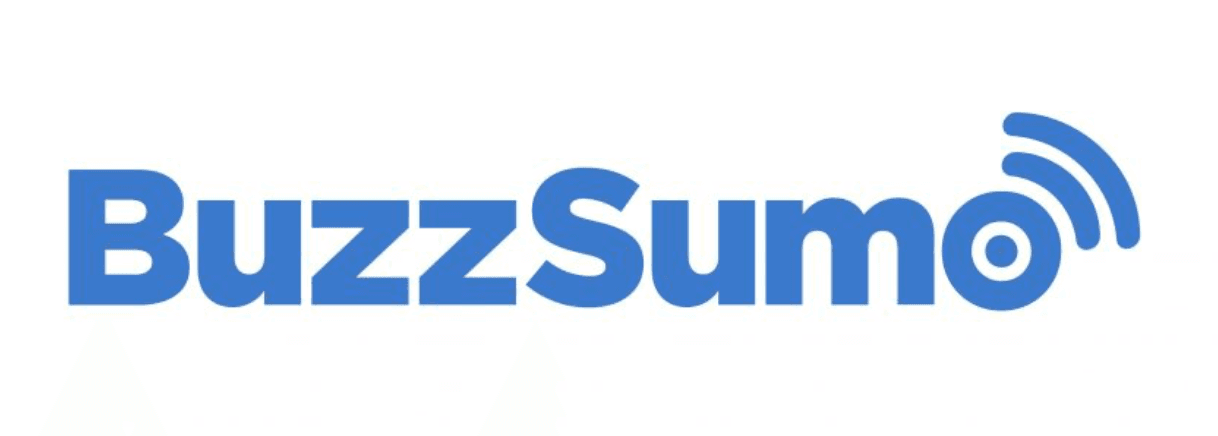
BuzzSumo is a dedicated social media analytics tool that excels in content analysis and discovery. Its influencer analytics are detailed, helping identify key influencers for effective marketing strategies. Furthermore, the competitive analytics feature of this social media analytics tool allows tracking of your competitors' most shared content.
Pricing: Starts at $119 per month.
Brandwatch – Advanced social listening and sentiment analysis
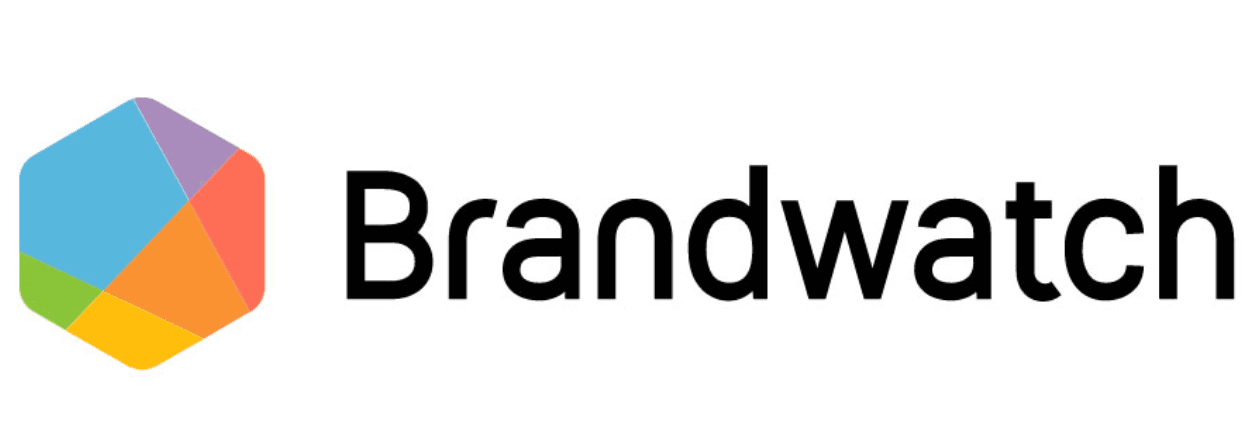
Known for its robust social listening capabilities, Brandwatch is a social media analytics tool that offers sentiment analysis, providing insights into audience perceptions about your brand. With features like trend tracking, competitive analytics, and the ability to identify key influencers in your clients’ industries, it gives an all-encompassing view of your clients’ data, positioning it as one of the top social media analytics tools.
Pricing: Starts at $800 per month.
Google Analytics - Track website engagement and conversion after the social click

Google Analytics is a critical social media analytics tool for deriving insights into website traffic, bounce rates, and conversion rates associated with social media. Its ability to correlate social media growth with increases in website traffic is a valuable feature not found in all social media analytics tools.
Pricing: Free
AgencyAnalytics – White-labeled reporting for agencies with 80+ integrations

AgencyAnalytics is a unique social media analytics tool that combines data across multiple social and digital marketing platforms into one reporting interface. It offers over 80 integrations, including the most popular social media, SEO, PPC, email, and eCommerce platforms, and is designed to demonstrate social media campaign ROI through data visualization and clear KPI tracking. With marketing dashboard templates and report templates, it stands out among other social media analytics tools for its quick setup and customization capabilities.
Pricing: Starts at $59 per month.
Buffer – Streamlined post scheduling and performance tracking

Buffer is a lightweight and user-friendly social media analytics tool, ideal for smaller agencies or lean marketing teams. While it’s best known for its intuitive scheduling interface, Buffer also includes performance tracking for each post and platform. Easily see which content resonates most, optimize your publishing times, and simplify your overall workflow—all without a steep learning curve.
Pricing: Free plan available; paid plans start at $6 per month per channel.
Rival IQ – Great for competitor benchmarking and social performance tracking
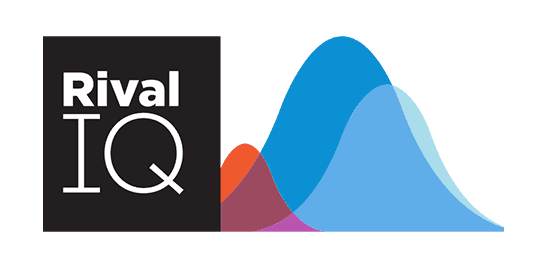
Rival IQ stands out for its advanced competitor analysis features, helping agencies understand how clients stack up in their industry. Track metrics like engagement rate, posting frequency, and top-performing content across rival brands—all in one dashboard. With side-by-side comparisons and visual data exports, Rival IQ empowers your agency to fine-tune strategies and stay ahead of the competition.
Pricing: Starts at $239 per month.
Sendible – Designed for agencies managing multiple clients

Built with agencies in mind, Sendible makes it easy to manage multiple social media accounts at scale. With unified publishing, team workflows, client dashboards, and detailed analytics, it’s well-suited for teams juggling dozens of brands. Sendible also includes sentiment analysis, automated reporting, and content calendar tools—streamlining your entire client communication process.
Pricing: Starts at $29 per month.
ContentStudio – Combines content planning with rich analytics

ContentStudio is a powerful all-in-one platform that blends content discovery, planning, publishing, and analytics. It's especially useful for agencies managing long-term content strategies alongside performance tracking. The built-in analytics features let you evaluate engagement across platforms, monitor trends, and collaborate with clients or internal teams—all from a single dashboard.
Pricing: Starts at $25 per month.
SocialPilot – Cost-effective tool with reporting and automation

SocialPilot is a budget-friendly alternative that doesn’t skimp on features. Designed for small to mid-sized agencies, it includes post scheduling, analytics, and white-labeled client reports. Teams appreciate the simple interface and ability to manage multiple social media accounts without getting overwhelmed. It’s a solid option for agencies looking for value without complexity.
Pricing: Starts at $30 per month.
Zoho Social – Affordable option for scheduling and analytics

Zoho Social offers strong scheduling and analytics features at a highly competitive price point. Agencies can track audience engagement, monitor brand mentions, and generate visual reports for client updates. With integrations into the larger Zoho ecosystem (like CRM and helpdesk), it's a flexible option for agencies that want to centralize more of their marketing tech stack.
Pricing: Starts at $15 per month.
Prove Social Media Campaign Success With AgencyAnalytics
Social media is the go-to place for insights into your client’s consumer behavior and provides direct insights into your client’s business strategy. How your agency quantifies and qualifies that data to prove the ROI of its social media campaigns is what will keep your clients coming back for your agency’s services.
Your social media analytics tool should combine all your social channels into one platform, collecting social media data from multiple social media networks. This includes important Facebook Ads data, Twitter analytics, Instagram metrics, LinkedIn analytics, and Google Analytics data.
For example, a LinkedIn analytics report should include data from both organic and paid LinkedIn efforts, as well as Google Analytics metrics to showcase audience behavior after they've moved from the social platform to your client's website.
AgencyAnalytics’ all-in-one reporting platform makes it easy for you to show the full picture of your social media marketing efforts. Choose from 80 integrations and drag-and-drop your clients’ real-time metrics to showcase ROI.
Choose from a host of marketing dashboard templates and report templates to get a head start–you’ll have them up and running in no time! Easily customize your templates and clone them when onboarding your next social media client.
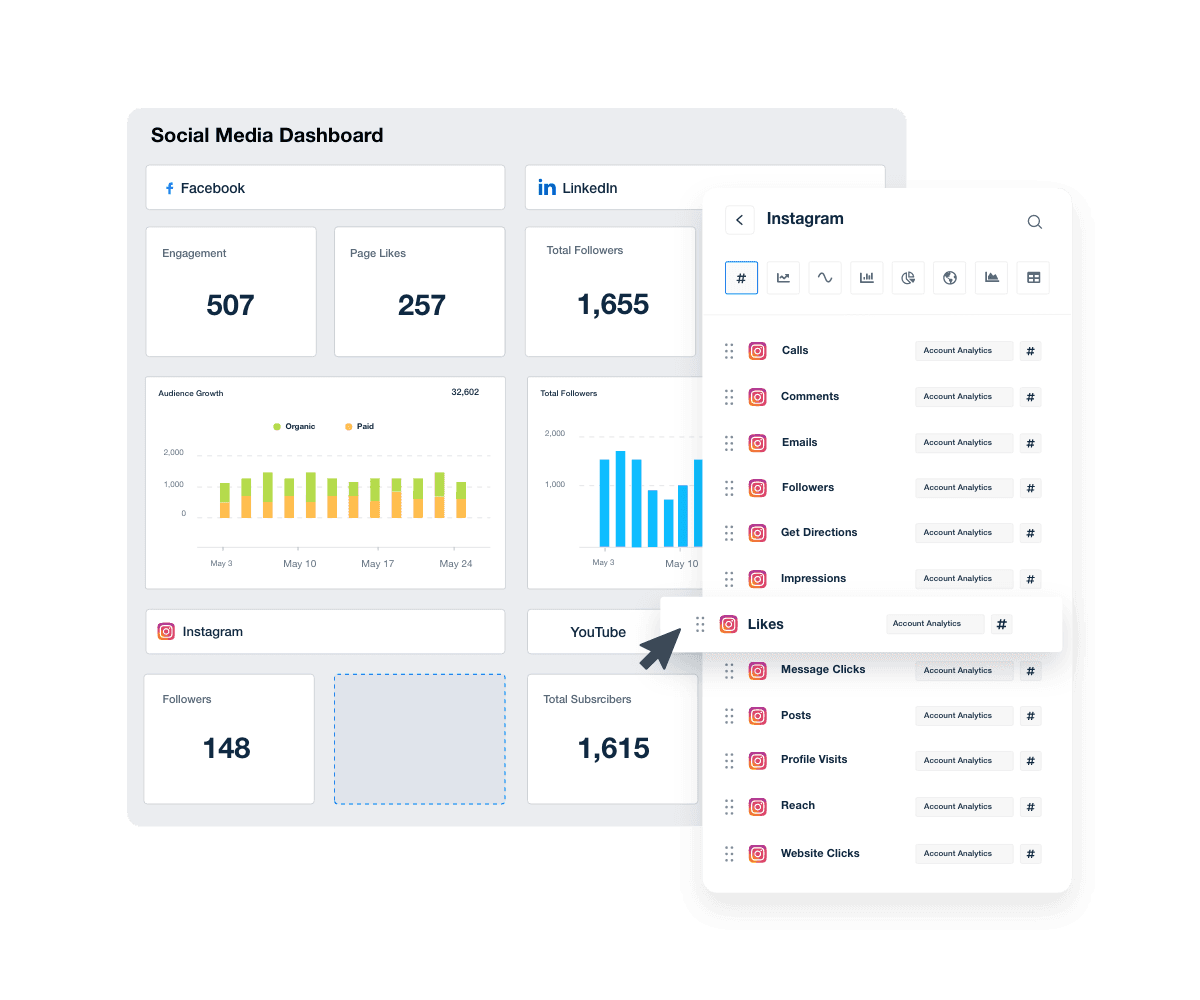
Show Google Analytics data like conversions alongside your clients’ social media performance data in a single dashboard. Try AgencyAnalytics free for 14 days!
💡 Agency Tip: In your reports, highlight where trends or traffic may be influenced by off-platform sharing—even if it’s not directly trackable. It shows clients you're thinking beyond the dashboard.
More AgencyAnalytics Social Media Analytics Tools To Choose From:
AgencyAnalytics has saved us hours every month in reporting time. Now we can provide far more thorough reporting for our clients, and it’s faster and easier to pull together. It also gives our agency a much more professional touch.

Because social media changes fast — from platform algorithms to audience behavior to new channels — every agency should revisit their analytics framework at least quarterly.
Use tools that support real-time monitoring, sentiment analysis, social listening, and flexible dashboards. And tie social metrics to real business outcomes via web analytics integrations.
Summary
Social media has become a powerful platform for agencies to connect with their audience, build brand awareness, and drive business growth. However, to truly harness the potential of social media, social media marketers need to understand and leverage social media analytics.
Social media analytics involves the collection and interpretation of data from major social media platforms. It provides valuable insights into user behavior, engagement, and emerging trends, which can inform strategic decision-making and help optimize social media performance.
There are a variety of social media analytics tools available that can help agencies gather and analyze this data. These analytics tools can track a wide range of metrics, from likes and shares to follower growth and click-through rates, providing a comprehensive view of a brand's social media performance.
However, the world of social media analytics extends beyond just tools. It's about understanding the data these analytics tools provide. This involves analyzing the data to identify trends, measure performance against set goals, and derive actionable insights that can inform future social media strategies.
Social media analytics is not just about collecting data. It's about making sense of this data to understand what's working, what's not, and how to improve. It's about using these insights to create more effective social media campaigns and deliver better client results.
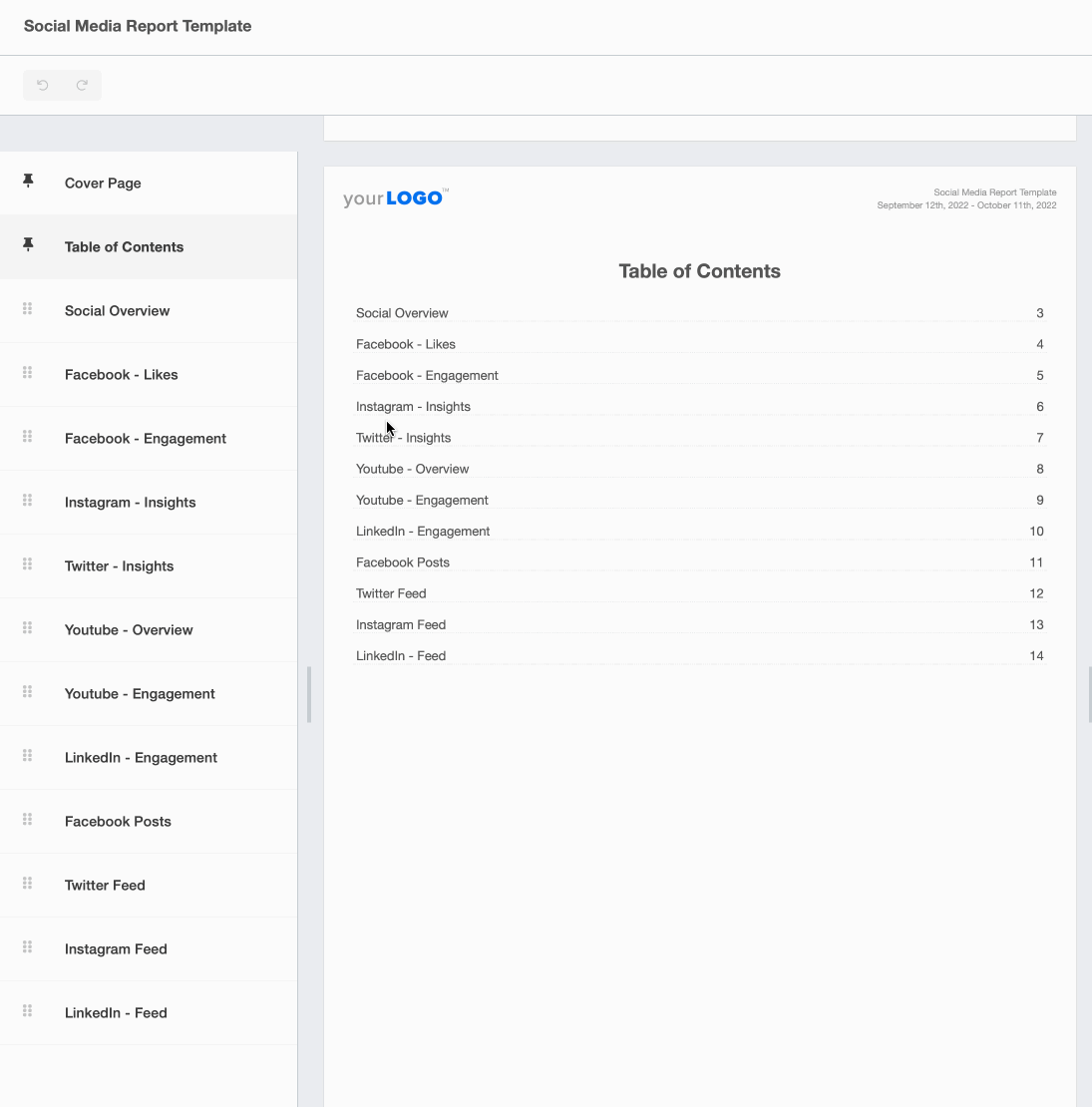
Try out customizable report templates and get your client reports automated and ready in minutes:
Multi-Channel Report Templates | Platform-Specific Report Templates |
|---|---|
Impress clients and save hours with custom, automated reporting.
Join 7,000+ agencies that create reports in under 30 minutes per client using AgencyAnalytics. Get started for free. No credit card required.
Already have an account?
Log inFrequently Asked Questions About Social Media Analytics
Get expert answers to common questions about social analytics—from choosing the right tools and building custom dashboards, to tracking audience growth rate, analyzing social presence across major networks, and turning unstructured data into insights that drive revenue growth.
The four main types (or pillars) of social media analytics are:
Descriptive analytics: What happened? (e.g., follower growth, engagement metrics, reach)
Diagnostic analytics: Why did it happen? (e.g., comparing content types, audience segments, timing, themes)
Predictive analytics: What might happen? (e.g., forecasting campaign performance or engagement trends)
Prescriptive analytics: What should you do next? (e.g., recommendations on posting schedule, content type, budget allocation)
Modern social media analytics tools often combine all four types to help agencies move from reactive reporting to proactive optimization.
Tools vary depending on your agency’s needs — from dashboards and reporting to listening and sentiment analysis. Here are 12 top tools used in 2025:
Sprout Social – All-in-one analytics and engagement platform for agencies
Hootsuite – Trusted dashboard with scheduling, analytics, and team collaboration
Buffer – Streamlined post scheduling and performance tracking
Brandwatch – Advanced social listening and sentiment analysis
BuzzSumo – Excellent for content insights, influencer tracking, and competitor analysis
AgencyAnalytics – White-labeled reporting for agencies with 80+ integrations
Rival IQ – Great for competitor benchmarking and social performance tracking
Sendible – Designed for agencies managing multiple clients
ContentStudio – Combines content planning with rich analytics
SocialPilot – Cost-effective tool with reporting and automation
Brand24 – Real-time brand monitoring and sentiment reporting
Zoho Social – Affordable option for scheduling and analytics
Here are five practical analytics use cases agencies rely on:
Audience growth tracking – Helps you measure brand reach and expansion over time
Engagement analysis – Identifies top-performing posts and formats
Conversion attribution – Connects social activity to website goals and sales
Sentiment analysis – Assesses public opinion and brand perception
Influencer impact measurement – Shows how partnerships drive awareness and engagement
Using social media analytics tools, you can extract these insights across multiple platforms in one place.
It depends on the tools you use. Manual reports can take 2+ hours per client, especially if they involve screenshots, spreadsheet exports, and custom analysis.
With a platform like AgencyAnalytics, agencies reduce reporting time to under 30 minutes per client by automating data collection, integrating client accounts, and using customizable templates.
AI reporting tools streamline the reporting process and surface insights faster by:
Automatically highlighting performance trends
Flagging underperforming metrics
Generating next-step recommendations
Detecting anomalies or sudden changes in campaign performance
Offering natural language summaries for reports
They help your agency go beyond the “what” and dig into the “why” — saving time and improving your strategic recommendations.
Social media data is raw information—likes, shares, impressions, clicks, etc.
Social media analytics turns that data into context—what’s working, what’s not, and why it matters.
Analytics = insights + action. It helps agencies justify campaign spend, plan smarter, and prove ROI.
A complete report should cover both platform-specific and business-level insights:
Engagement rate (likes, shares, comments, saves)
Reach and impressions
Follower growth rate
Top-performing content
Click-through rate (CTR)
Conversions and goal completions (via GA4)
Referral traffic from social to website
Sentiment trends (if tracking brand perception)
Influencer campaign results
Customer service responsiveness
Use a tool that pulls these into one place so your team doesn’t have to do it manually.
Ideally:
Weekly for campaign pulse checks and time-sensitive optimizations
Monthly for deep dives, client reporting, and strategic planning
Quarterly to identify long-term trends and pivot strategies
Agencies using tools like AgencyAnalytics can automate weekly dashboards and monthly reports to keep everyone aligned and informed.
To optimize your agency's social media campaign performance, use a social analytics tool that provides both macro and micro levels of insight. The right tools should offer in-depth analysis of campaign reach, engagement, and conversion metrics across major social networks like Instagram, LinkedIn, Facebook, Pinterest, and YouTube.
By analyzing audience insights, brand sentiment, and engagement analytics, agencies gather a complete picture of what’s driving success—and what needs improvement. Features like custom dashboards, real-time monitoring, and automated reports help your social team make strategic business decisions based on actual data, not guesswork.
Using platforms that also support Instagram Insights, LinkedIn analytics, and Pinterest analytics allows your team to compare performance across most social media networks in one place—ensuring every campaign is data-informed and client-focused.
Social media software should be more than just a publishing tool—it’s should also provide a powerful tool for analyzing consumer sentiment and monitoring relevant conversations in real time. This helps marketing teams identify emerging trends, manage influencer campaigns, and detect shifts in brand health across different social networks.
By pulling in data from review sites, social accounts, and even unstructured data sources, agencies gain a deeper understanding of how their clients are perceived online. This goes far beyond tracking metrics—it includes understanding social conversations, customer care experiences, and the broader customer journey.
This analysis helps enable users to fine-tune marketing tactics and create more meaningful, personalized content for future campaigns, driving stronger relationships and measurable revenue growth.
Yes! There are several free tools available that help agencies analyze accounts, monitor audience growth rate, and guide an effective social strategy. While paid platforms offer deeper insights and custom dashboards, free tools like Google Analytics, Meta Business Suite, and native platform insights (like Instagram Insights or LinkedIn analytics) still provide valuable information.
These tools allow you to gather insights on how much traffic is driven from each social network, which content gets most traffic, and what types of posts bring in new followers. An easy-to-use dashboard is especially helpful for smaller agencies or clients just starting out.
While free tools can’t match the comprehensive analysis or competitive intelligence of paid platforms, they’re a great place to begin identifying important metrics and aligning your team on the same page—especially when building the foundation of a scalable analytics strategy.

Written by
Melody Sinclair-Brooks brings nearly a decade of experience in marketing in the tech industry. Specializing in B2B messaging for startups and SaaS, she crafts campaigns that cut through the noise, leveraging customer insights and multichannel strategies for tangible growth.
Read more posts by Melody Sinclair-BrooksSee how 7,000+ marketing agencies help clients win
Free 14-day trial. No credit card required.



